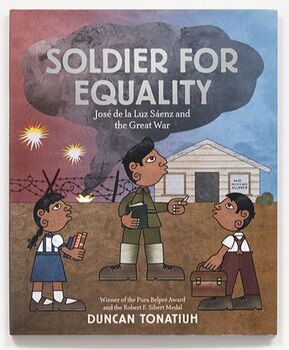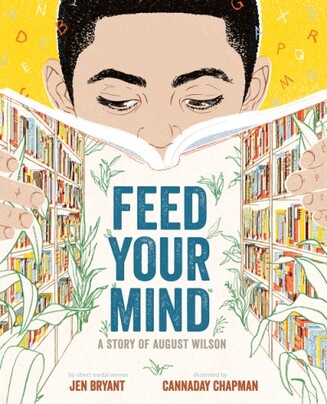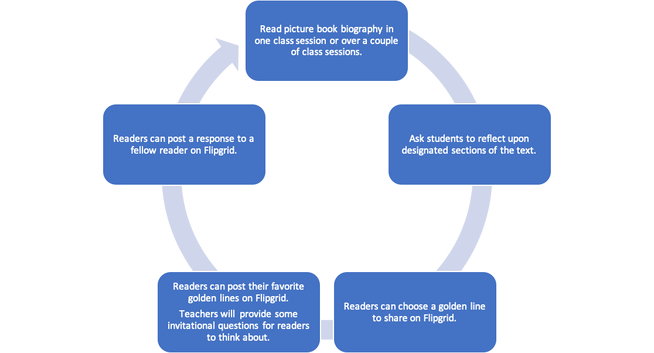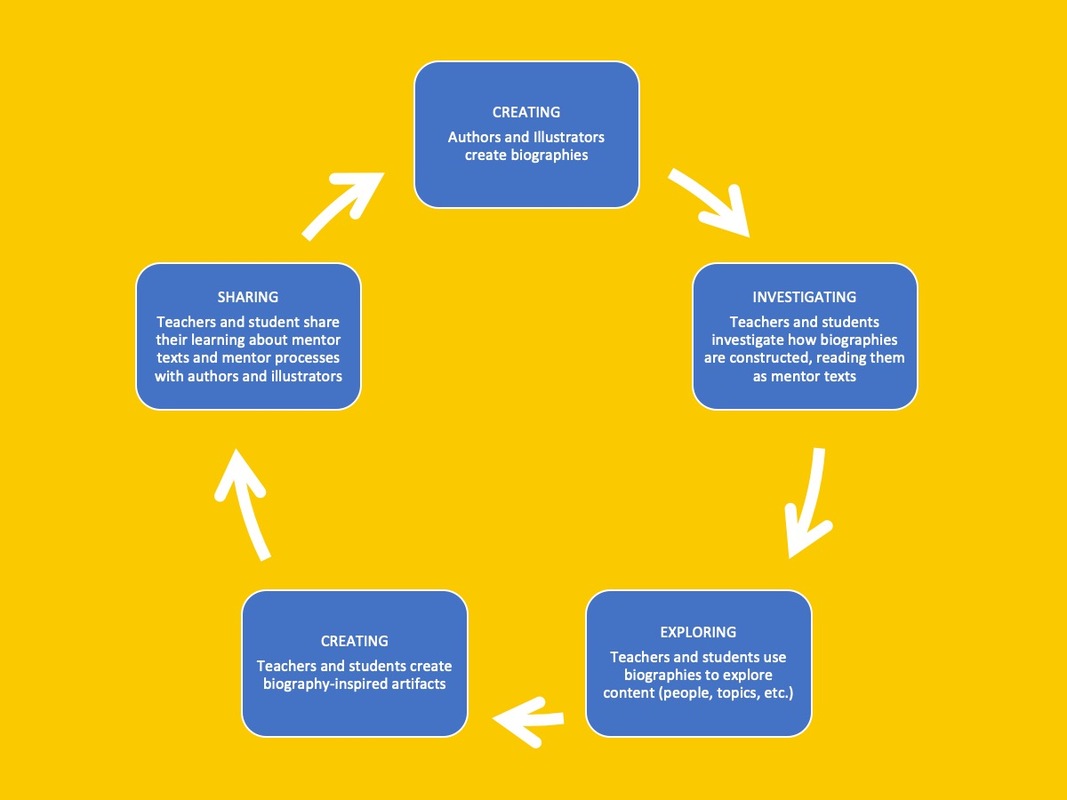BY JEANNE GILLIAM FAIN Reflecting on the 2020 NCBLA List, our seven-member committee believes in the influence of each individual book and the power of the books grouped together to offer another layer of meaning. After reviewing over 400 titles with 2019 copyright dates appropriate for readers in K-8th grade, the members of the 2020 Notable Children’s Books in the Language Arts Committee met online to decide upon our final list of 30 titles. We read books multiple times and learned from each other as we carefully considered the craft of each book. In this post, I am going to highlight two picture book biographies from the 2020 NCBLA List: Soldier for Equality: Jose´de la Luz Sáenz and the Great War (2019) and Feed your mind: A story of August Wilson (2019). Tonatiuh, D. (2019). Soldier for Equality: Jose´de la Luz Sáenz and the Great War. New York, NY: Abrams Books for Young Readers, unpaged.
Bryant, J. (2019). Feed your mind: A story of August Wilson. (C. Chapman, Illus.). New York, NY: Abrams Book for Young Readers, unpaged.
Golden Line Strategy & Flip Grid Both picturebooks feature high-quality language and there are many golden lines, lines that really resonate with the reader, within these texts. The golden line strategy involves the reader choosing a specific line from the picture book biography that causes the reader to pause, ponder, reflect, and/or question the text. The line should purposely connect with the reader. Readers can choose the golden line from the text and post responses on Flipgrid. Using flipgrid, the reader can record the reading of the golden line. The teacher can post invitational questions on the flipgrid. Readers can create their own response or answer one of the invitational questions and post on flipgrid. Readers can listen to their peers' golden line responses and post a response back. Invitational Questions:
Meet the Notables Committee
Jeanne Gilliam Fain is s a professor at Lipscomb University in Nashville, Tennessee and Chair of the 2020 Notables Committee. The Tuesday, August 18th blog post has been removed at the request of its authors.
BY MARY ANN CAPPIELLO & BARB ROSENSTOCK on behalf of The Biography Clearinghouse People are hardwired to connect to other people. From birth, research tells us that babies prefer human faces over all other images. People are also hardwired for story. For tens of thousands of years, we humans created stories and listened to them as if our lives depended on it. Often, they did. Story helps us process the present, connect to the past, envision the future; and reflect on broader cultural issues. Story developed along with language itself. Stories about people’s lives are called biographies. With this post, we’re introducing a new initiative to explore the potential of the powerful genre of biography to connect students with the broader world. The Biography Clearinghouse, endorsed by the Children’s Literature Assembly of the National Council of Teachers of English, developed out of casual conversations about biography’s underused potential. We are an expanding set of educators, authors, students and interested readers working together to use biography to champion diversity, explore history, model agency and support perseverance. This fall, we’ll be launching a website to support educators as they explore the ways the craft of biography can connect students—with the past, with the future, and with each other. Our core principles express the belief that biographies are uniquely positioned to accomplish a variety of classroom goals. They can be read for pleasure and academic learning. They can evoke student wonder and prompt questions. They can address real issues in society and help students build empathy and know that they are not alone. Our principles affirm that biographies can support Literacy, Content Area/Disciplinary Literacy and Socio-Emotional Learning. A fuller articulation of the principles can be found at our Biography Clearinghouse Principles document.
The Biography Clearinghouse website will address the process of investigating biographies, crafting biographies, and exploring content areas with biography. Biography creators will share their process, research, and motivations in writing and illustrating these complex works. Since real people advocate, solve, write, read, experiment, and create; we can use real people’s diverse life stories to explore all content areas: history, mathematics, language arts, science, and the arts. Biography gives students a way to see what is really possible in the world. Working with stories of the struggles and triumphs of accomplished people can ignite students’ own activism, agency, and perseverance. You will hear from The Biography Clearinghouse via the CLA blog every three weeks this fall as we add new content such as book titles, author interviews, research artifacts and teaching materials. Additionally, to keep ourselves responsive to the unique challenges our classrooms face this year; we want to hear from you! We want you to join us as part of The Biography Clearinghouse initiative. We invite your help in crafting this new story—to use the connection to others inherent in diverse people’s lives to encourage curiosity, creativity and commitment in your students. Please email [email protected] with your questions, ideas, and classroom dilemmas. Or, comment below if you’re reading this on Twitter or Facebook. We’d love to know how you’ve used real people’s stories in the past, and how you’d like to see them used them in the future. We invite your help in crafting this new story—to use the connection to others inherent in diverse people’s lives to encourage curiosity, creativity and commitment in your students. Barb Rosenstock is the author of many picture book biographies for children. Her books have been awarded Orbis Pictus and Sydney Taylor Honors, among many other awards. Otis and Will Discover the Deep, illustrated by Katherine Roy, won a SCBWI Golden Kite Award, and The Noisy Paint Box, illustrated by Mary Grandpré, was awarded a Caldecott Honor. Mary Ann Cappiello teaches courses in children’s literature and literacy methods at Lesley University, blogs about teaching with children’s literature at The Classroom Bookshelf, a School Library Journal blog, and is a former chair of NCTE’s Orbis Pictus Award for Outstanding Nonfiction K-8. Update 9/1/2020: Readers may also be interested in the post: Ideas for Change with Tonya Bolden’s Maritcha: A Nineteenth-Century American Girl by Jennifer Graff and Courtney Shimek (on behalf of the Biography Clearinghouse) BY LAUREN AIMONETTE LIANG & XENIA HADJIOANNOU As the days of August are marching on and the beginning of the 2020-21 school year is approaching, it is becoming increasingly clear that this will be another challenging year for students and educators of all levels. SARS-CoV-2, the virus that causes COVID-19, is still looming large in our daily lives and our plans for working and learning with our students. In the absence of firm solutions for treatment and inoculation from the virus, and in the context of growing numbers of infections across the United States, schools are faced with complex and challenging decisions about how to pursue their mission in safe and academically robust ways. Our hope and intention here at the CLA Blog is to offer resources and support to educators as they plan for what is sure to be an extraordinary year of teaching and learning. We aspire to offer helpful ideas for sharing children’s literature with students through various instructional modes, as well as continue to maintain a focus on amplifying diverse voices, highlighting literary works representing diverse perspectives, and supporting an antiracist social justice agenda. We are grateful to various CLA groups and individual CLA members for volunteering to contribute posts to the CLA Blog over the coming weeks. New posts will be published every Tuesday. We are delighted to announce that in Fall 2020 the blog will feature:
Our thoughts are with you as you expertly handle the many new preparations, alongside frequent and often abrupt changes, to plans for this fall in your classrooms. We value the outstanding work that you do, and hope that you are able to stay safe during this challenging time. Lauren Aimonette Liang is an associate professor at the University of Utah and the current president of CLA. Xenia Hadjioannou is an associate professor at Penn State's Harrisburg campus and the webmaster of the CLA website. |
Authors:
|
CLA
About CLA
|
Journal of Children's Literature
Write for JCL
|
ResourcesCLA-sponsored NCTE Position Statements
|
Members-Only Content
CLA Video Library
|
© COPYRIGHT 2018.
ALL RIGHTS RESERVED |





 RSS Feed
RSS Feed